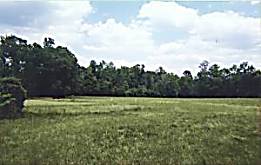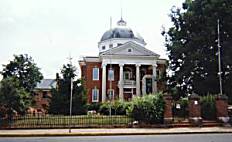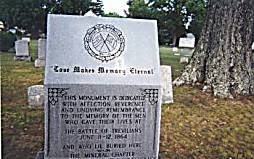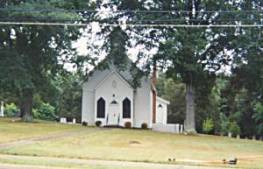 |
Louisa County was formed in 1742 from Hanover County that had been formed in 1721 from New Kent County. Prior to 1700 few settlers lived in this area. It is believed the Monaccans Indians, known as Monasiccapaccoes, were gone by the time the first settlers appeared in the 1700's.
|
|
| B y 1720 there were many land grants resulting in rapid settlement of the area. Tobacco had been the staple crop of the area for these early settlers.
Between 1700 and 1742 the area had been transformed from a wilderness to a community of citizens who wished to handle their own affairs. The Andersons
These families were loyal to the American Cause. The Merriwethers, Johnsons, Andersons, Dabneys, and Whites were all in for the change from the Royal government to the Commonwealth of Virginia and the Declaration of Independence. |
||
|
On December 13, 1742 the first court of Louisa County was held at the home of Matthew Jouett. While whipping post and stocks are thought of being the property of the New England Colonies, the courts of the day were very harsh. The court documents of the day describe trials with harsh sentences and many hangings being ordered |
 |
|
| by the justices with the last public hanging in 1902 with a man named Hicks for murder of his son-in-law.
Louisa County official documents document many men taking part in the French and Indian Wars. The citizens of Louisa County didn't have much use for the English Government when the American Revolution started. It's been stated that if you were thought to be a sympathizer to England you might be seen swinging from a tree when a rider passed by your way. The aboved named Louisa County families of influence played key roles in the militia of the day often holding positions as militia officers. During and after the revolution "Publick Claims" were paid to the citizens so they could recover the expenses they endured in feeding and caring for the militia troops. Our documented grandfather, David Anderson, died in 1781 as the revolutionary war was winding down. It is not known if his death resulted from any acts of war. David's wife and our first documented grandmother to this family line, Judith, is documented in a "Publick Claim" furnishing beef to the militia troops during the Revolutionary War. Many of the Andersons were merchants. Merchants purchased land and slaves in their good years and sold them in their bad years. David Anderson is believed to have been a small merchant. Indications are he died with his estate insolvent and his executors to his will and estate refused to act on his will. It would be fair to speculate that the Revolutionary War was not good for a merchant's business, and while gaining their independence from England they paid a high price in assets and business. After the American Revolutionary War, English merchant companies were allowed to sue in American courts for debts owed them. One such suit is believed to be against our grandfather David, but since his estate was so insolvent the suit was dropped. The David Anderson's descendants, documented herein, left Louisa County Virginia in 1807 and moved to Garrard County Kentucky. Archilaus Anderson, son of David, took his whole family to Kentucky. His sister, Susanna, and her husband, Henderson Lawrence, also came to Kentucky at the same time. |
||
 |
Even though the family had left Virginia by the Civil War, the war had a great effect on documentation of the Anderson family of Hanover and Louisa Counties. When the Union troops were burning much of Virginia, Hanover County sent its records to the city of Richmond for safekeeping. Richmond was burned during the Battle for Richmond | |
| and the Hanover documents were lost to the fire. Louisa County had kept its records at home so most of their records survived the Civil War.
These Anderson Family Records that would have tied many of the missing links for this family together were destroyed when the Hanover records burned. Since the Andersons were of the first settlers to New Kent County from which Hanover County was formed, there was much information relating to this family lost forever. |
||
|
The Church of England parishes played major roles in the life of these colonial settlers. The governor appointed ministers and the churches were state-supported by taxes. The parishes played vital roles in public needs and county upkeep as county commissioners do today. David was member of the St. Martin's Parish in the 1740s. When Louisa was formed from Hanover County, St. Martin's Parish |
 |
|
| took in parts of both counties. St. Martin's Parish was soon divided and a new parish, Fredericksville Parish, was established. By 1760 the extent of the Fredericksville Parish was so great that the interests of the parish could not be handled by the same vestry. This resulted in another division and the establishment of the Trinity Parish. David was a member of this Trinity Parish at the time of his death in 1781. An appointed position of vestryman in a parish was a high position in the scheme of these settlers' lives. Many Andersons held this position of responsibility.
Parishes kept many vital records as births, marriages and deaths. The record keeping in the St. Martin's Parish left many important documents, while the records for the Trinity Parish were neglected by its Minster. Many of these families would eventually break away from the Church of England and become members of what we know in history today as the "Prosecuted Baptist" and the "Traveling Church". The Traveling Church name came from the fact they could not have a regular meeting place for fear of prosecution. About one hundred Baptist Ministers were part of this church traveling from village to village. Many of the government-supported ministers of the Church Of England had become corrupt and drank too much, losing the confidence of the people. David and Judith Anderson lived in Louisa County near the Old Mountain Road between Shelfar and Orchid. David and Judith were neighbors and friends of the Shelton and Farrar families that joined their land, and also most likely related to them. After Judith's death, David and Judith's children sold the family land and home to the Farrar family in broken amounts. Cornwallis marched down the Old Mountain Road on his failed attempt to capture Governor Thomas Jefferson at Monticello near Charlottesville. What a view of American Revolutionary history David and Judith must have had from the front door of their home! David and Judith Anderson lived near the Goochland and Louisa County lines in Central Virginia. Hanover County is north of Richmond Virginia, Louisa County northwest and Goochland County west. Richard Anderson and his son Richard came from England to Virginia in 1635 on two separate seagoing vessels. While the Anderson descendents documented herein have not been linked by documentation to Richard Anderson, most researchers believe these families are descendants of this Richard Anderson. Much has been written and published about this family from the early 1900's. While many researchers have struggled with connecting the links between the Anderson families, many questions still remain unanswered. |
||